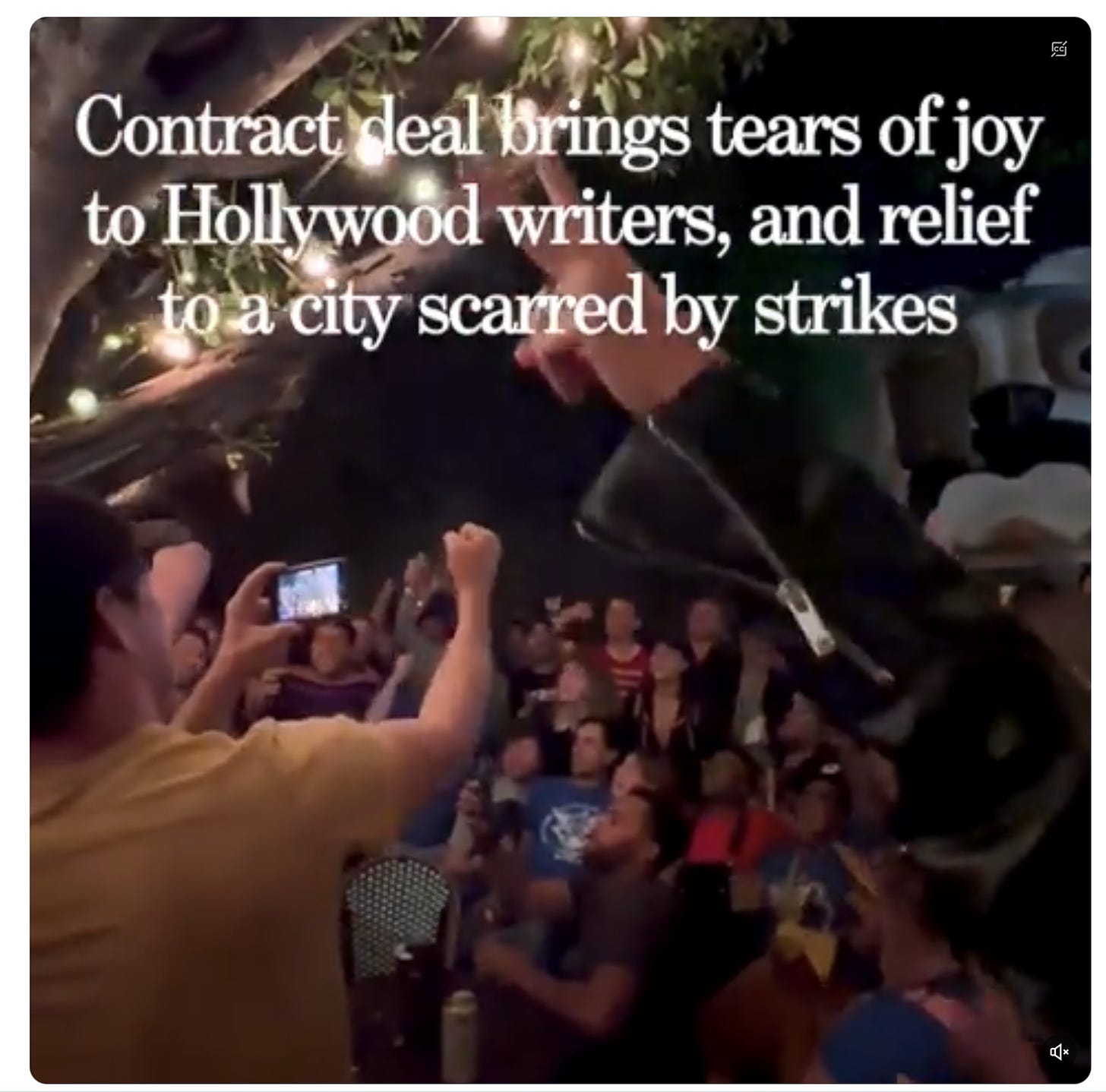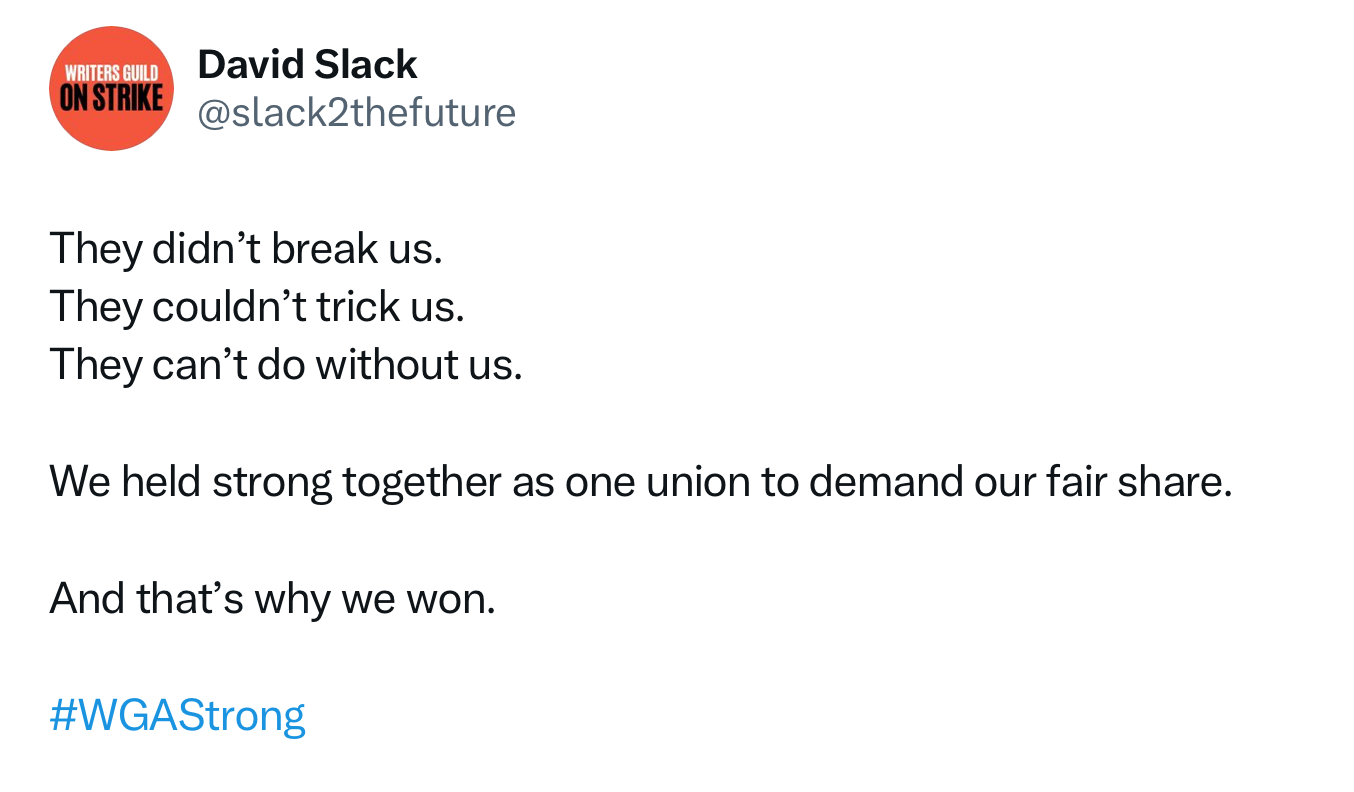After 146 days, a strike by the Writers Guild of America (WGA) that shut down most TV and film production is poised to end in victory for the union. News broke late last night that the WGA had reached agreement and finalized language on a new contract with a group of chief executives from the major studios including Disney, Warner Bros. Discovery, NBCUniversal and Netflix, who stepped in to represent the Alliance of Motion Picture and Television Producers (AMPTP).
Let’s take a moment to dissect the results for both sides, assuming, as is highly likely, that the union members will vote to approve the deal. Then let’s zoom out a bit and see what this means first for the entertainment industry and then more broadly for the power and strength of unions in the U.S.
Winners and Sinners
For the WGA, the agreed upon deal is a considerable win. “We can say, with great pride, that this deal is exceptional — with meaningful gains and protections for writers in every sector of the membership,” the WGA negotiating committee said in a statement late last night. Spontaneous celebrations broke out as news of the deal emerged, and a crowd of writers and their supporters cheered, “WGA! WGA!”
The union has called an end to picketing as the deal is finalized for a vote by the union’s 11,000 members on Tuesday.
The WGA stuck to and achieved its demands for better residuals, especially for shows on streaming services. They also demanded and received more health care contributions while achieving minimum staffing requirements for episodic TV shows.
The union reportedly also broke through on the question of the use of artificial intelligence (A.I.) that could encroach upon writers’ credits and compensation, something that has held up finalization of the deal for several days. In the end, the protections around A.I. only comprise two paragraphs out of a massive contract, but they are a significant two sections. It may take some time for legal and tech experts to measure the impact of those new terms.
The solidarity of the union and on-the-ground activism on the picket lines, organized through dozens of strike captains, also helped keep pressure on the studios. The union successfully shuttered productions that sought to keep filming even after it was “pencils down” from the writers.
For the studios, there was no victory lap. The executives now recognize that their earlier refusal to negotiate with the WGA, particularly around the sensitive issue of A.I., was a mistake. They had previously stated that the A.I. issue would have to wait until the next contract in 2026, but that was unacceptable to the WGA negotiators, and for good reason: A.I. is moving so fast and dominating so many industries so quickly that in three years, writers could have found themselves out of many jobs, replaced by bland computer copyists.
The strike went on for many months without the two sides meeting at all, with each side blaming the other for refusing to negotiate. (Narrator: It was the studios that caused this.) The economic pain hit the writers hard, but the studios even harder. In a securities filing, for example, Warner Bros. Discovery stated that its profits would be between $300 million to $500 million lower due to the twin strikes of the WGA and SAG-AFTRA, the union for actors. Some analysts estimate that the studios could suffer losses of $1.6 billion in global ticket sales due to production delays. The share prices of the movie studios began to suffer, but they jumped on Monday on news of the resolution.
Another factor that likely was at play in forcing the studio executives’ hands—one that other states faced with the economic impact of strikes should consider—was unemployment insurance. The state legislature in California recently passed a bill to grant limited unemployment pay to the striking workers, and that bill was heading to Gov. Newsom’s desk for signature. It would have undercut the studios’ biggest, cruelest weapon: starving out the strikers. With the possibility that the state government would now come in with economic aid for the writers, the studios knew that they had lost their leverage.
What’s next for Hollywood?
While the WGA strike appears to be close to an end, the actors’ strike continues with many of the same issues still under negotiation. These include royalties from streaming, better working conditions, and limitations on and guardrails around A.I.-generated content. A primary sticking point includes the union’s request for two percent of total streaming revenue, which the studios say is a non-starter.
But with the studios eager to reopen production and staunch the economic bleeding, SAG-AFTRA, which represents some 150,000 actors, now seems to have the upper hand, and some major sticking points may evaporate. Indeed, it is likely that many of the principles that WGA laid out in its deal, especially around A.I., will form a basis for negotiations on a contract with the actors’ union.
California is eager to see productions restart, given that some five percent of the state’s economy is dependent upon the film and television industry. There are some 100,000 workers—crew, make-up, wardrobe, lights—who depend on productions for their livelihood, not to mention the vendors, restaurants and services that rely on the flow of money and the presence of people on sets for their revenue.
But until a deal with SAG-AFTRA is also reached, the strike is not over and production remains halted on most movies and television shows. We’ll see how long the studios want to continue to haggle rather than get going on making money again.
The spillover effect
The summer of 2023 saw some of the biggest strikes or threatened strikes in recent history. The WGA and SAG-AFTRA strikes affected hundreds of thousands of people. The Teamsters and UPS averted a crippling strike after the company agreed to most of the union’s demands for higher pay and better working conditions. Starbucks and Amazon have been fending off strike threats on a regular basis. And now the UAW strikes against the Big Three automakers have the attention of Washington politicians, including President Joe Biden who is traveling to join the autoworkers on the picket line.
The success of the Teamsters and WGA, and likely success of SAG-AFTRA, will be a shot in the arm generally for organized labor and will likely embolden the UAW in its demands. American public opinions on unions is also on the rise, with two-thirds of Americans backing organized labor in a recent Gallup poll.
Workers across many industries are feeling threatened by stagnant wages, lack of benefits such as sick days and child care, and the encroachment of A.I. upon their work. Unions are a potential strong counterforce to these trends. As the WGA and Teamsters proved, unions can force highly profitable companies to share more of their record profits and help equalize the balance of power between owners and workers, whether they are truck drivers or writers.
For many decades, union membership has declined steadily, as capital and investment headed overseas, U.S. factories were shuttered, and the GOP passed “right to work” laws that cut the legs out from under union funding and membership. The result was a devastating hollowing out of the American working and middle classes, a condition the current administration is trying very hard to change. The White House is approaching the problem with a combination of strong support for unions alongside new infrastructure, technology and green energy investments. With Joe Biden objectively the most pro-union president in our nation’s history, it seems clear that next year’s election will prove decisive in whether unions continue to regain ground as a force within the American economy.






Corporate greed is the root of so many problems, including inflation. That the Fed hasn't addressed this is malpractice. They and the media can blame regular workers finally making a little more money as the cause for inflation, raising interest rates to make things even more unaffordable, but until corporate greed is fully addressed, regular people will continue to suffer for it. Good for the unions. Happy for the WGA and cautiously optimistic about SAG and the UAW. Thank goodness for Joe Biden. He and the Democrats must win big in 2024. They must.
"Narrator: It was the studios that caused this." Love it.
Did anyone else imagine that in Morgan Freeman's voice?